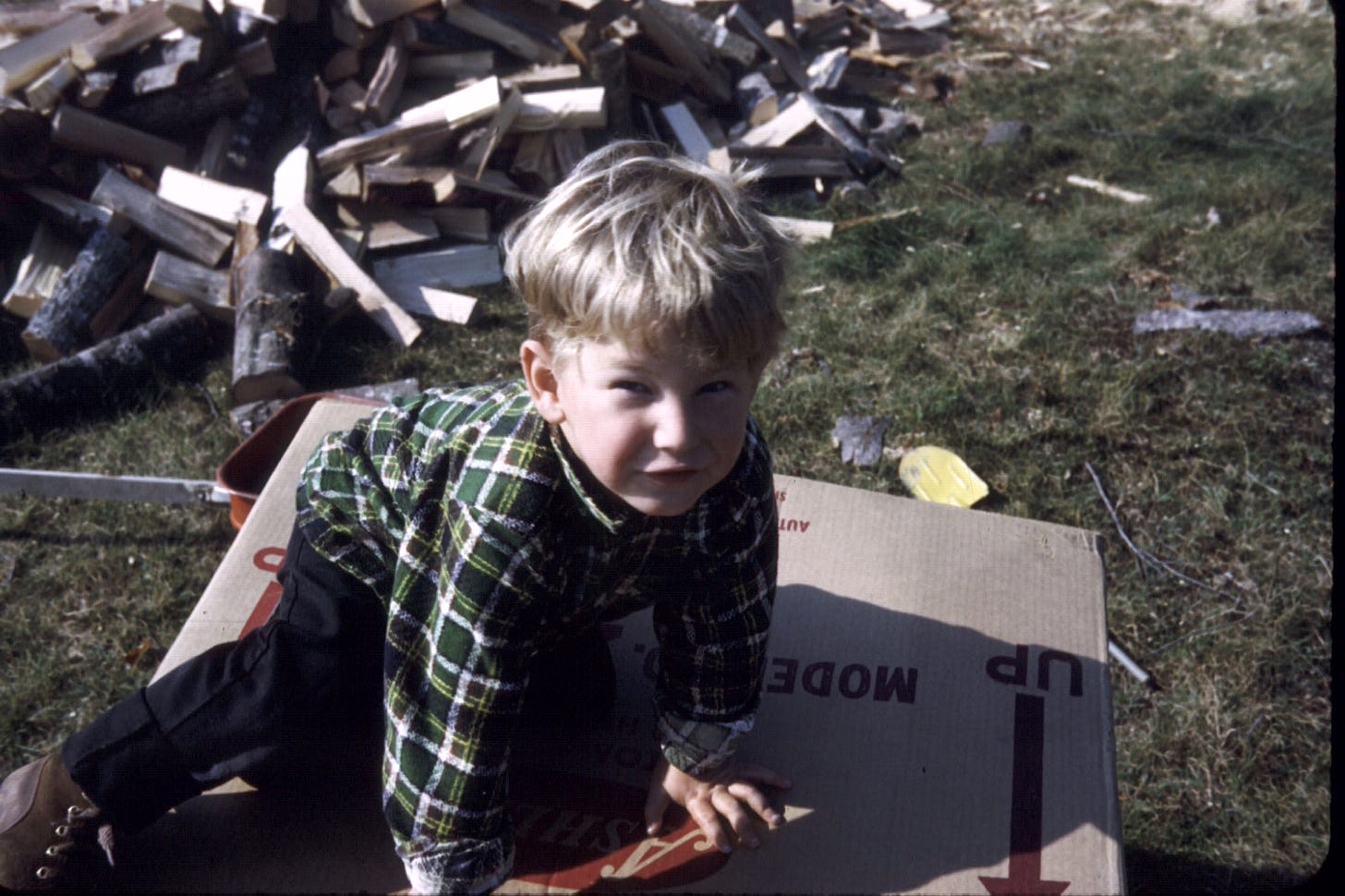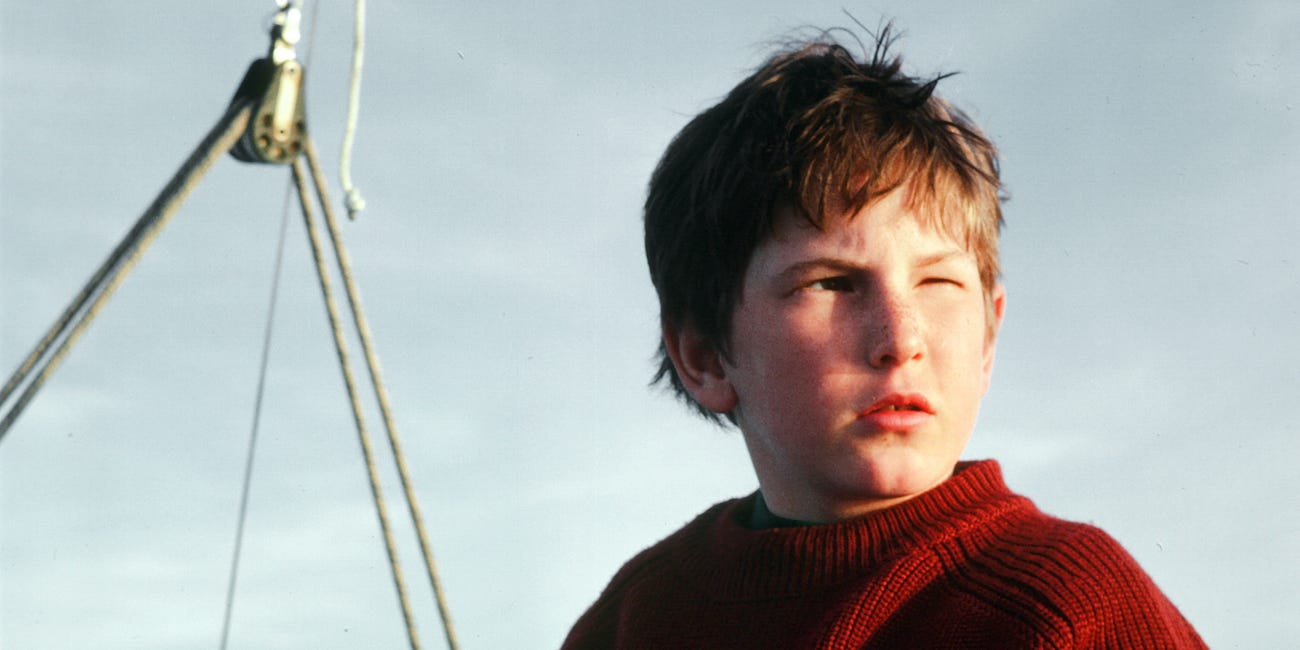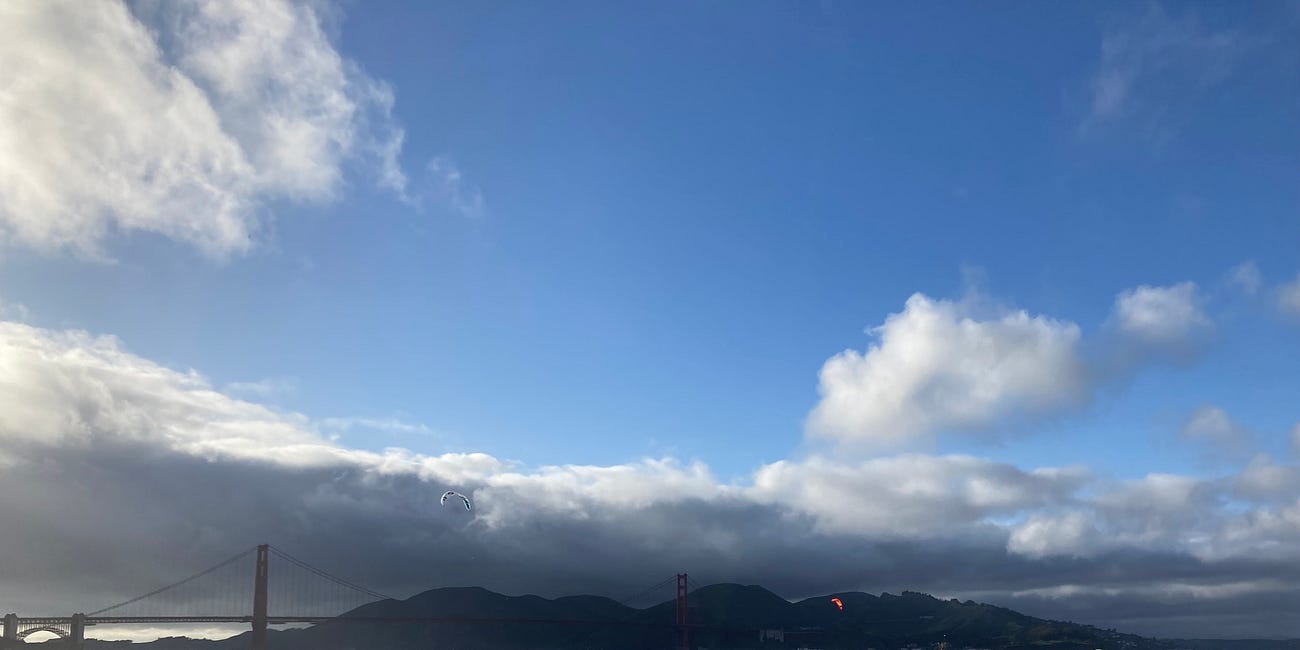Chapter 2 — A Frisco kid growing up in Maine—and, how to sharpen a chainsaw
An Ordinary Disaster — chapter 02 — Round File
I was born in San Francisco, but before I was much more than a year old, the house my parents were renting burned right to the ground. Everything was gone except my mother’s wedding ring, which my father managed to sift from the ashes. Still in their twenties, they saw the fire as the end of their city life and went looking for a homestead, driving east across the country, headed for New England. Their idea was back to the land, somewhere to raise their kids in peace, but I can’t help seeing it as a retreat—it was away from California, back from where they came, back to the old hills of Maine.
They settled on some dirt-road acreage far enough inland from the mill and shipyard towns to be out of the fog, built a house, planted a garden, ran chickens, sheep, hogs and dogs—a new life assembled so quickly that by the time of my first memories, it felt fully formed. I loved being a boy there and there was no way for me to know what had come before, and still, somehow, I knew that I was just a visitor, and that I had come from somewhere else.
* * *
I’m out running in the woods behind our house. I’m small and I can’t run fast, but my legs are whirring like the wind in the trees all around me. I’ve heard the names from my father—birch, ash, maple, hickory. Good hard wood, he says. What I can see are mostly birch, slender trunks with peeling white curls of papery bark and dark knots like so many eyes. I love looking up at the tall columns of the trees moving in the air, their leaves and branches whispering together, and even more I love climbing over the fallen trunks, because every one of them has a story of men with their axes and their saws.
On the maps that we study around the kitchen table there’s a huge expanse of green to the north and west of where we live, a roadless sea of trees full of loggers and their camps, where the men sleep in smoky bunkhouses, eat flapjacks, file their saws, and cut wood all day. These are the stories that I’ve been told about Maine.
I’m dodging fallen logs rotting as they lie, full of worms and mushrooms. I’m brushing past wet-tailed ferns and blueberry bushes, catching my pants on brambles and soaking my little shoes in mossy green boggy patches, light coming though from the sky to make bright spots all around my feet going crunch crunch crunch in the leaves, running not as fast as I can, but just because I can, not from fear, just running because I want to take as much of everything in as possible, running in stops and starts, looking every which way—and then as I pass a low spot with a stream on my left, I see a dark line emerging between the trees. My feet fall three more times, pulling up as I near it, and then I stop to stare at an old stone wall, stretched low and silent as far as I could see in both directions.
The wall is half hidden in the leaf litter, camouflaged, decaying, ancient. The forest around the wall has been logged and grown and logged and grown again, but the wall was made and it stayed, gaining weight, watching, collecting time, and so the wall has stories too.
There’s a low spot where a few stones have come loose and lie covered with acorns and brown leaves. I reach out and run my hand along the top of a speckled two-hander, feeling the furry moss, bright green painted on grey gneiss. With my arm extended I see that my sweater has bits of pine needles and bark stuck to it, and that two ants are crawling towards my wrist. My hand moves slowly across the soft moss and bare stone, the moss springy like a pincushion, the stone cool and wet, like the stones at the top of the well near our house. I know that the fence is built of stones heaved up out of the fields, collected and carried and stacked to mark the lines between one family’s land and another. The woods where I’m standing was once one of those fields, long ago left and grown full of trees again now, the hands that dug the rocks long gone too, but the wall remains, slowly dissolving back into the cool, dark earth.
I lie down in the duff next to the wall. It feels good to be close to its weight. I want its story to soak into me. I want to know what was here, who was here, who built the wall, what was on this side and what was on the other side. What was here before all the trees grew back? What was it called before it was ours?
All of the roads that I know nearby are named for the places they connect, and all the places are named for people, and all the people’s names that I know are also places too. The Wegler’s farm across the road is the closest. The hill where the Spedolas live is farther. I know Lincolnville Road, Muzzy Ridge Road, and Moody Mountain Road. This line of old stone would have had a name too. I sink into the forest floor for another minute, dreaming down along the long story of the wall as it disappears into the dark of the woods, grey stone, green leaves, brown earth and shadows—and then I remember where I am, stand up, shake myself off, and take off back towards the house.
* * *
You need wood in Maine, wood to build and wood to burn. Hard wood burns well, and it takes work to fell and split. One neighbor had a logging rig—an old truck stripped down and fitted with a second transmission. My dad said it had sixteen speeds, a very big number to small boy, and that thing could crawl over anything, hauling logs behind with a choker chain.
I’m in the woods with my father, watching him take down a tree. He holds a chainsaw by the back handle. The engine is bumping along as it idles, speaking in sleepy chainsaw talk like water bumbling over rocks in a stream. He guns it for a second to keep it running and I can feel the heat coming off the saw. “Let’s let it cool down,” he says, “the chain needs sharpening.” The saw coughs to a stop. He sets it down and explains how the engine drives a gear that drives the chain. The cutting teeth on the chain look just like dog teeth.
I see the file in the pocket of his overalls, and now he takes the file and works along the chain at an angle, zwip zwip zwip. He sharpens each canine, pushing the chain around the bar, and then puts the file back in his pocket. He uses a wrench to tighten the nut on the bar, and then he tells me it’s ready to go again. I look up at my dad and take a step back. He pulls the handle and the saw starts, burping blue smoke, the smells of fifty-to-one exhaust, wet-green forest, and sweet wood chips all around us. I watch him holding the idling saw, and he turns to look up at the trees, deciding which to cut.
* * *
Many years later, my friend John asked me to help him take down a few volunteer eucalyptus on a piece of property that his own father left him up in Sonoma. We drove north in the early morning to be there in time to rent two saws and have the full day for lumberjacking. As we got close to the tool rental place, he leaned over and said, “I should have asked earlier, but have you ever used a chainsaw? or taken down a tree?” I looked back at my friend. He knew me as a competent person, even to the point that it hadn’t occurred to him to ask me if I knew how to run a chainsaw until we were just minutes from firing them up. I rifled though my memory banks for a moment, confirming the fact that hadn’t ever used one, but that even so, I was quite confident in being able to do so, because of my time as a boy in Maine. It felt good to know that, and to know that my friend had so much trust in me. I turned back towards him with a smile and said, “No, but I know what do.”
We spent the morning felling the smaller of the dozen-or-so trees that had come in along the north side of the property, running our saws nonstop. Watching my dad fell trees at the age of four had shown me everything I needed to know. I could feel my father’s movements coming through my own body as soon as I picked up the chainsaw. I could feel his big, strong hands on the handles of the heavy, powerful and dangerous tool. I could feel his arms swing the weight of it and place the blade against the tree in just the right spot. I felt his gaze marking the place for me to cut, and guiding the saw as I made a triangular notch in the trunk, so that it would fall just where I wanted it to. I could feel his body in my body, now that I was, more or less, the age he had been when I’d absorbed this bone knowledge from him as a small boy, just by watching.
After a few hours, I felt my saw catching as I went to make my next cut. I could smell that the metal was hotter than it should be. I stopped my saw. John walked over, his own machine idling in his paw. “What’s up?” he asked. “The saw’s too hot,” I said, “The chain needs sharpening.” Looking back at me with a tilt of his head, he asked “how do you know?” “See the sawdust? Should be chips. Saw’s getting dull.” While I was saying this, I could see that he was digesting the fact not only did I know how to fell trees, but I knew how to tell when a chainsaw needs sharpening. It was a proud moment. I asked him, “You got a file there in your van?” “Maybe,” he said, “What kind?” The image of the file in my father’s hand appeared. “Round file,” I said.
He fished around in his van, found a file, and handed it over. I worked back and forth along the chain at an angle, making a swooping metal sound, zwip, zwip, zwip. I sharpened each tooth, pushing the chain around the bar, and then did the other saw. When I was finished, I handed the file back to my friend and then tightened the bar nuts with a crescent wrench. We sat on two trunks we’d felled earlier and ate sandwiches, smelling the fresh-cut wood and feeling the sun and the breeze coming across the field. After lunch, I pulled the handle and started my saw again, ready to cut wood.
Thanks for reading, and for being part of this journey.
This is part of AN ORDINARY DISASTER, the book-length memoir about a man learning to listen to himself, and the price I paid until I learned how to do that, serialized right here on Substack with a new chapter published every week.
You can find everything from the memoir that I’ve published so far right here.
DECIDE NOTHING is a reader-supported publication. To receive new posts and support my work, please consider becoming a free or paid subscriber.
Further reading
Here’s the table on contents for the memoir.
You might also enjoy some of my other work, such as
The Man Pays
My friend Meredith always had a knack for finding places where rent was optional. I was on one of my early trips to New York City, summer of ’97 I think, staying with her and another friend from college in a fourth-floor walkup on Second Ave near 11th—and the owner had just disappeared. Not quite a squat, like the occupied warehouses that I knew of in S…
or any of the other essays that you can find here
Eighteen essays about addiction, masculinity, creativity, and intuition
I recently divided my stack into sections—memoir, essays, mediations, and perhaps soon more—and in doing so I was reminded that I’ve put out no fewer than eighteen long form essays so far here, on topics ranging across anxiety, fitness, creativity, sobriety, self-discipline, purpose, love, adventure, sciatica, pain, AI, intuition, the collective unconsc…
What does this bring up for you?
Please share, comment, restack, recommend, and click the little ♡ heart right there 👇🏻 if you dig this piece. I’d love to hear from you!





I really enjoyed this chapter Bowen!
I find your writing leaps off the page in a way that makes the reading experience very smooth. I also really liked the expression “sharpened each canine”